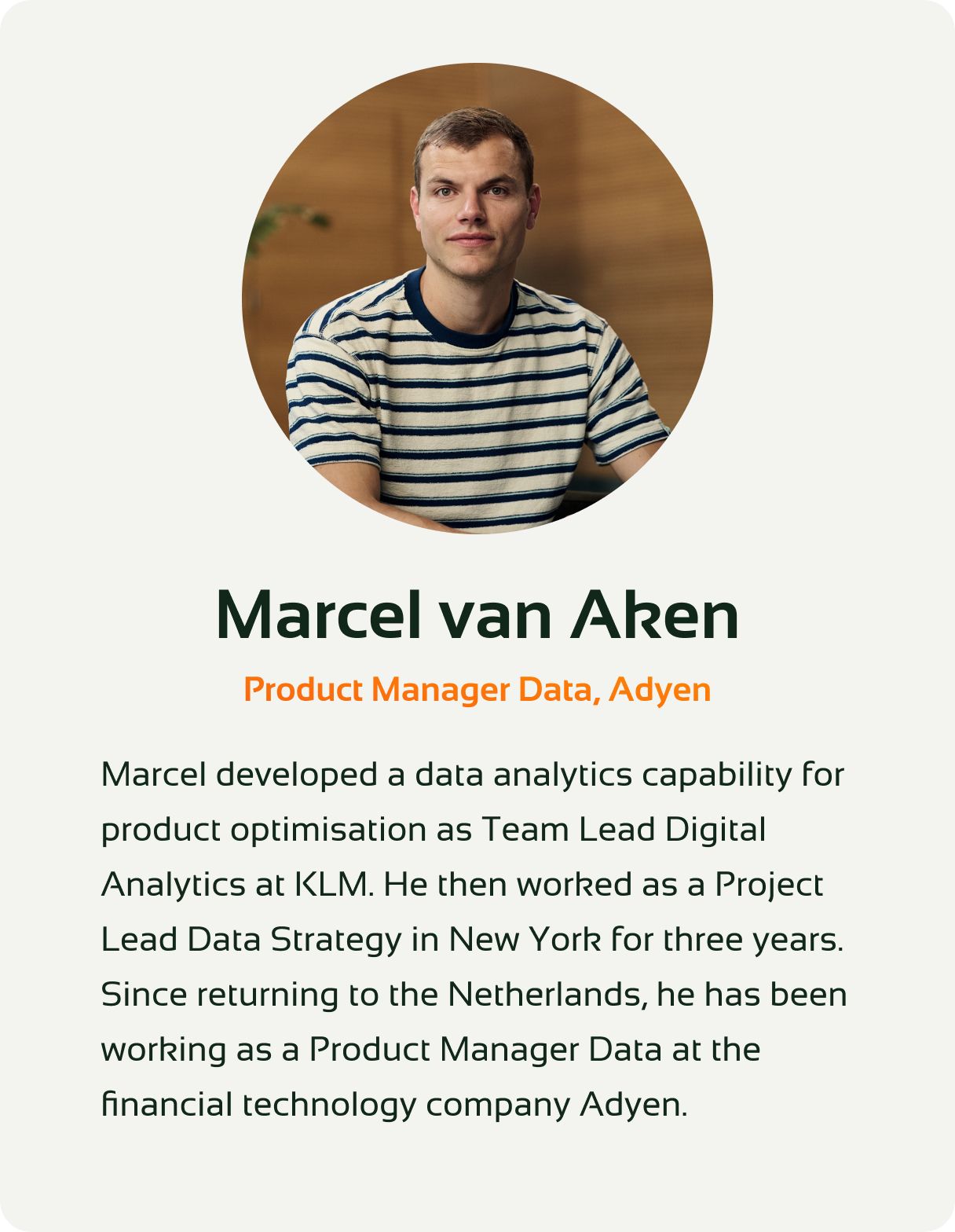Data strategy expert interview: a golden mountain of data
An interview with product manager data Marcel van Aken
- Article
- Data Strategy


Nowadays, almost every organisation is aware of the need to work data driven. They understand the importance, but few have managed to succesfully implement a data strategy. In this interview series we talk about the definition of data strategy, use cases, opportunities and tips from data strategy experts.

How have you experienced the developments in the data domain in recent years?
In 2015, I worked for an organisation that organised events about data. That's how I got acquainted with data and strategy from a business context. At that time, the field was still in its infancy. Two years later, I started working on the topic of data strategy as part of KLM's digital transformation.
Back then, it was mainly about the practical choices we made as an organisation in the field of data strategy. Because it was a relatively new topic, we approached it in a decentralised way. Business experts focused on how working in a data-driven manner could impact specific areas. The belief was that operational experts are best equipped to assess how, for example, aircraft maintenance can be predicted.
At the same time, there was also a centralisation effort, especially in the area of data itself. It mainly concerned storage and was less about the value that had to be delivered. Data had to be stored centrally. Terms like data lake and big data platform were everywhere. Here, the thought was, ‘As long as you have as much data as possible, you will do cool things with it.’ Hence, collecting data became a goal in itself.

The goal of data-driven working is always to create business value. I compare it to building a mountain and extracting gold from it. You can build a beautiful mountain, but if you don't extract the gold, it won't do you any good. Then you're just wasting resources and money.
In recent years, there has been increasing focus on the business usability of data. The USA is leading in this area, and some Dutch organisations, such as Adyen, are already fully engaged in it. The focus is now on growing the mountain while using the data intelligently. We still have a lot to learn in this regard. We're trying to tame a wild animal while teaching it tricks. That's a tricky combination!
At the corporate level, more and more core (leadership) teams are being formed in the field of data. This happened two years ago at Adyen, it is now also happening at KLM, and I saw the same development as a consultant in American companies.
Incidentally, I still only see a few CDOs in companies. As far as I'm concerned, a CDO is not essential; it depends on the structure of your company. The more hierarchical it is, the more important the title becomes. The important thing is to have someone responsible for the data. Here, it is crucial to determine whether that person is a gatekeeper or truly responsible for how the data is used throughout the entire organisation. In my opinion, this is the key point of a data strategy: knowing where your data is positioned within a company.
What is your definition of a data strategy?
A data strategy is a combination of choices about how the organisation handles the data it (in)directly possesses in order to achieve business objectives.
The way I see it: your data strategy determines the choices you make and the direction you take. Your strategy provides guidance on what you do and don't do. How will you use the data at your disposal and how will you link it to your business problems? Will you use it to better understand the added value of your current product(s)? Or are there opportunities to productionalise the data you possess and fully focus on that?
Why is it so complex to develop a data-driven mindset?
The complexity and volumes we have today did not exist 30 years ago. There are not many experienced people because the field is still relatively young. In order to teach others about the applications and possibilities of data, you need to have sufficient knowledge yourself.
Getting people on board is both very difficult and very easy at the same time. It is enormously complex because the subject keeps adding new elements, and the world as people know it has been created without data as the basis for decision-making. On the other hand, no one can ignore the large tech companies that have made data their business model, and everyone is convinced that they need to do something with it. Meanwhile, you are still constantly learning and discovering what you can do with your data.

When it comes to data, the costs are also accrued before any benefits arise. First, you need to collect the right data, store it properly, and derive insights from it. In short, you need to find gold in the mountain. You have to ask yourself: How can I use my data to transform my business model?
What are the main challenges in implementing a data strategy?
The main obstacle is the investment you have to make without being able to prove that it actually works. There aren't enough success stories about data yet that prove that it truly pays off. It is easy to point to big tech companies, but how does it work for a traditional airline like KLM that cannot simply rebuild all of its business processes?
Meanwhile, your data organisation is still pioneering. Sometimes a project doesn't yield the value you expected upfront. You should see this as paying tuition: you gain insights that you can take with you to your next project. Because it is new, you can compare a data initiative to a startup in terms of opportunism. Failure is part of the process.
Sponsorship from senior management is important. However, you are asking a lot from them. Data-driven working is high risk in the short term, but also high reward in the long term.

Not everyone is willing to take part in this, but it is a crucial condition for success. Senior management can also empower people just below them to take advantage of the freedom that exists.
Can you share a few success stories with us?
Adyen is originally a payment service provider but has evolved into a financial technology platform. This goes beyond just payments. Because they have extensive knowledge in this area, they can develop other products. From a central data department, they analyse the existing data and explore how it can be applied.
Several of our financial technology services can be well explained using the example of a donut shop. Let's say a supplier of the donut shop needs to be paid today, but the donut shop doesn't have cash available. Based on payment data, Adyen can identify that it's a temporary cash flow shortage and therefore expedite the regular payout period to today for the donut shop.
And what if this shop wants to expand by offering not only donuts but also great cappuccinos? Adyen can provide a loan for a coffee machine, where data models determine the credit risk for Adyen. It's safe to say that data is the brain behind these products.
During his time at KLM, Marcel and his team also looked at how existing processes could be improved. He mentions a great example here.
All ground staff at KLM have an iPad. If, once at the airport, you want to change your seat, for example, they can assist you using that iPad. For KLM, this is a real revenue driver: it allows more expensive seats to be sold last minute.
In practice, however, it didn't work optimally. After the seat had been changed using the KLM employee's iPad, as a customer, you had to complete the payment on your own device via a QR code that needed to be sent. There was a significant drop-off at this point: the seat was already changed, but the payment would then not go through.
Because we had insights into this data, the product team was able to develop a solution. A few months later, the customer could not only pay via a QR code but also via WhatsApp, SMS, WeChat, etc. This way, the payment options were much better aligned with customer needs, resulting in more successful transactions. Here, process optimisation led to increased revenue.
Can you tell us what a data strategy project looks like?
The schools within the school community that I supervise collect a lot of data. This includes the academic results of students, their attendance and development. There is also data from teachers, such as the format of their lessons. Additionally, there is data related to the school's management, such as HR, Marketing, and Finance. Furthermore, publicly available data on the social environment is also being used. This includes population development and competing school locations in the region.
Within the school community, there was a desire to do more with all this data, but there was no vision for this. Meanwhile, government agencies such as the Education Inspectorate increasingly expect schools and school communities to be able to substantiate their policy and results with data.
Traditionally, a school does not have the capacity to meet all of these expectations. Teachers and school management are already under pressure. Working in a data-driven manner can add value, but how do you implement it without increasing the workload? A pragmatic approach is essential in this context. This means that you should not always technically strive for the highest achievable goal, but rather look at what are realistic goals.
What tips do you have for people who want to get started with their data strategy?
1. Try to deliver value as quickly as possible, no matter how minor.
Organise it in a decentralised way: just start. Don't just keep building and building. Verify if it works as soon as possible. For products, the principle is: launch fast and iterate.
2. Start by gathering information: what data does the company have, and what are the quick wins?
From that overview, you can assess the value of that data.
3. Look for opportunities where the use of data can solve business problems in multiple places simultaneously.
Take a closer look at existing business cases and ask yourself, "If data can yield us this, how could data be an accelerator in this?"
4. If you define the problems within your organisation properly, the choices regarding technology, processes and people will follow naturally.
Therefore, take a broader perspective. Are you aiming to tap into a new market or to expand your market share? This will affect the strategic choices you need to make in your data-driven approach. In the first case, you need to quickly look for new data points, while in the second case, you should focus on what you already know and identify new opportunities.
5. Learn from companies that have already made the switch and successfully transformed their business models.
Think of examples like Netflix (which started as a streaming service and now produces its own movies and series) and Spotify.
Download our data strategy e-book
Discover other tips from data strategy experts and learn how to maintain control and truly extract value from your data.

How do you think the data domain will develop?
Currently, if you want to know your sales from yesterday for five different stores, you have to open a dashboard and apply filters before getting an answer. I expect that in the future, you won't have to perform these actions yourself; you will only need to ask the question. The computer will retrieve the relevant data for you and immediately visualise the answer with the appropriate filters applied.

We can already see this trend with the rise of AI applications like ChatGPT. Simply providing data is no longer enough. People are getting more and more used to asking a question and receiving a comprehensive answer. This requires a lot of data. How can you ensure that your data is prepared in such a way that an answer is generated within 2 seconds? We are not there yet, but what steps do we need to take to get there? And how will we address this tomorrow, towards the end of the year, and in the coming years? That is the big question for me.
Data privacy is also a very important topic. At Adyen, I was pleasantly surprised by the data ethics working group. If you want access to data, you must first complete mandatory training on ethical dilemmas. The ethical aspect of data-driven working and the impact of algorithms on humanity as a whole are still underexplored themes. I miss the public debate on this. My niece is now in first grade, and they are already working with computers. Everyone should learn what data is from a young age.
We have been collecting data in the world for a long time, but when you see how exponential the growth is at the moment, you can't ignore it anymore. There are numerous examples of disruptors. Do you want your company to still exist in 50 years, maybe even in 10 years? Then you need to take these developments seriously; otherwise, you will be out of business by that time.
Stay informed about data strategy
This interview is part of a series about data strategy. Want to be informed when the next article has been published? Sign up for our email list and stay 'up to data':
This is an article by Marloes de Bruin, Marketing Manager at Digital Power
Marloes de Bruin is Marketing Manager at Digital Power. She is a strategic, all-round marketer, passionate about data-driven marketing. She writes on a variety of topics using input from our data consultants.
Marketing Managermarloes.debruin@digital-power.com








